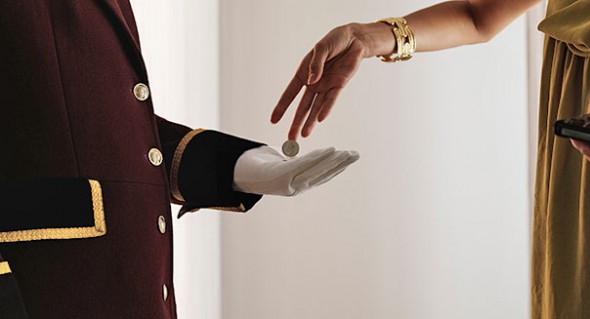
To tip or not to tip. For travelers, what to do about tipping while traveling can be a vexing question. While in America tipping is a standard and usually at 15 percent on services, in other countries, such as China as an example, tipping is not only frowned upon it is often against customs and laws. But while you might get scored for tipping a taxi driver in Beijing, your tour guide expects it and depends on it.
To help American travelers cut through the tipping tangle and help them decifer the deal on tips, country to country, GoBankRates.com compiled information from TripAdvsior, Condé Nast and other travel-focused publishing arms and established an A-Z guide of 25 countries and the tipping etiquette they require.
Australia
In general, travelers in Australia do not need to tip service providers; nothing extra should be added to your bill and there’s no shame in asking for change. The reason tipping isn’t customary Down Under is Australia’s significantly higher-than-average minimum wage — service charges aren’t necessary to supplement workers’ incomes. If you do insist on leaving a tip, 15 percent is more than sufficient for waitstaff, you can give $1 per suitcase to bellhops, leave $1 to $5 per day for housekeepers, and give $10 to $20 to the hotel concierge. But there’s no guarantee your tip will be accepted.
Austria
In many Austrian restaurants, a service charge is included in the bill, and it is customary to round up the total when paying. You can leave several extra euros or simply say “danke” (“thank you”), which is the Austrian equivalent of “keep the change.”
Europe is pretty lax about taxi-cab tipping; simply letting a driver “keep the change” in that scenario can usually suffice. That said, you should give one to two euros to hotel porters and leave a 10 percent tip at restaurants if a service charge isn’t automatically tacked on.
Brazil
Travelers in Brazil are not expected to tip unless a non-standard service was provided. Many bars and restaurants add a 10 percent service charge at the bottom of a bill, but patrons are not expected to pay it. In general, if you’re receiving a good exchange rate during your travels to Brazil, any extra gratuity you can offer service staff is greatly appreciated, even though it’s not expected.
Canada
Tipping in Canada is very similar to the United States. It’s customary to tip 15 to 20 percent in Canadian restaurants, at least 10 percent to taxi drivers, and a little extra to hairdressers, manicurists and hotel staff.
Chile
Good news travelers! Tipping in Chile is easy and cheap. Tourists usually don’t need to tip taxi drivers, and all other service workers should generally get a small tip for good service. Simply rounding up the total is typical, but a $5 tip is considered very good and $10 will ensure you receive five-star service. The biggest thing to remember is travelers should only tip in pesos (except in hotels) and especially avoid foreign coins — exchange houses in Chile won’t change them.
China
No one tips for services in China (it’s actually illegal to tip taxi drivers in many areas) with one major exception: tour guides, who make the bulk of their income through tips and the commissions they earn during shopping stops along the tour.
Costa Rica
In bars, restaurants and coffee shops, a 10 percent service charge is typically added to the bill. Travelers can pay more if the service was exceptional, but it’s not expected. A caveat: Many Tamarindo restaurants will add the 10 percent service fee, but say “service not included” at the bottom of the menu, or waiters might add “tips appreciated” on your bill. Again, tourists are not required to leave extra, but additional gratuity is appreciated.
Croatia
In Croatia, tips are almost always included in the bill, so it’s not necessary to leave extra. If you are dining with a very large group, you might want to consider topping off the service charge — but again, it’s not mandatory.
France
According to French law, all bills in cafes and restaurants carry a 15 percent service charge — not paid to the waiter, but to the owner of the establishment, who pays his staff. As such, tipping in France (that is, leaving additional gratuity on top of the automatic service charge) isn’t obligatory — but it’s certainly appreciated by French servers, who the BBC reports make only a little more than minimum wage.
Germany
Even though service charges are included in the menu prices at German bars and restaurants, it’s typical to round up your total bill or leave an extra 5 to 10 percent tip. It’s also very important for travelers to know they need to tell the server to add the tip to the final bill — it’s not customary to leave money on the table after you pay.
Greece
Tipping in Greece can be a little tricky. First, it’s not obligatory, but it is typical to round up the amount of your final bill. Some restaurant owners do not allow staff to keep their tips, so ask first (to avoid just paying extra to the institution). Also make sure your bill reflects the advertised prices — and, when in doubt, ask the locals for advice.
Iceland
Traveling to Iceland is expensive, but while you might be paying more for everything, from your hotel to your dinner, all the service fees are included. Icelanders are familiar with the tradition of tipping and won’t turn you down if you try, but you are definitely not expected to tip for any services.
India
Tourists in India are expected to tip all service workers, except for taxi drivers. Sometimes the service charges are included in your bills, but if not, an appropriate tip is anywhere between 10 and 20 percent, depending on the level of services received.
Ireland
Compared to the United States, there is not a strong tipping culture in Ireland. Still, many tourists do tip for services, especially restaurants and taxis. If you aren’t sure how much to tip, a good rule of thumb is leaving 10 percent.
Italy
Italian restaurants will display service charges on the menus and add the fees to the check, making tipping in Italy fairly straightforward. Still, don’t be surprised if you also see charges for items like tablecloths and silverware — these expenses are legal in many regions except Lazio. Travelers should also keep all their receipts; some policemen have been known to ask for proof of payment after leaving a restaurant.
Jamaica
Even though many establishments in Jamaica do not charge service fees, most Jamaicans appreciate any additional gratuity. If a tip isn’t included, it’s typical to leave between 10 and 18 percent gratuity, depending on the service. Because the tipping culture is so inconsistent, it’s best to check your bills for service charges or ask hotel staff for some advice. Also, many all-inclusive resorts strictly prohibit staff from accepting any tips whatsoever, so make sure you know the policies before you attempt to tip any service workers.
Japan
Tipping in Japan is not mandatory, and in many cases, tips might be refused. Because tipping is not part of the culture at all, the simple act of leaving a tip can make someone very confused. If you insist on leaving gratuity, put the money in an envelope and say “kore-ha chippu desu,” which means “here is your tip.”
Maldives
A 10 percent service charge is added to everything in the Maldives, but staff members earn very low salaries, so it’s generous to tip more for good service. Additional tips are critical for employees who don’t receive any portion of the service charges at all, which isn’t uncommon.
Mexico
Tipping etiquette in Mexico is very similar to that in the United States. Pesos are preferred over any other currency, and there are an abundance of automatic teller machines where travelers can withdraw funds. It’s best to ask hotel staff which machines are safe to use as reports indicate Mexico has a high rate of ATM fraud. A good rule of thumb:
- Restaurants: 10 to 15 percent
- Hotel porters: 10 to 20 pesos per bag
- Concierge: 100 pesos minimum
- Housekeeper: 20 to 50 pesos per night
Netherlands
Tipping in the Netherlands is a breeze. Service charges aren’t included in the prices, so it’s customary to leave just 5 or 10 percent. The only exception is if the service is bad — then you aren’t expected to leave anything.
Philippines
In the Philippines, the service charge is already included (you might see “SC” on your bill) or travelers can tip independently, usually 10 percent. Like many other countries on this list, the staff might not actually receive any of the added service charges, so you may want to tip extra if you received good service.
Spain
The Spanish are sticklers for manners and etiquette, so it’s wise to always leave at least something. Tips can range anywhere from small change to rounding to the nearest euro.
Switzerland
Swiss federal law requires all service charges to be included in advertised prices. There is no obligation to tip anyone, anywhere, and service workers are paid decent salaries. Still, many residents do add small gratuities by rounding up to the nearest five or ten francs, or more for large groups or parties.
Taiwan
The only service providers who expect tips in Taiwan are bellhops and employees in international hotels. Restaurants typically add 10 to 15 percent to the check to cover gratuity, and it’s not necessary to tip cab drivers. Still, travelers should leave a 10 percent tip at spas and beauty parlors, and when in doubt, just ask locals for advice.
United Kingdom
Laws require employers to pay at least the national minimum wage, whether workers receive tips or not. Accordingly, the tipping culture is not very strong in the U.K. Even so, it’s never a bad idea to leave any extra change.


































































































































































































































































































Get Social